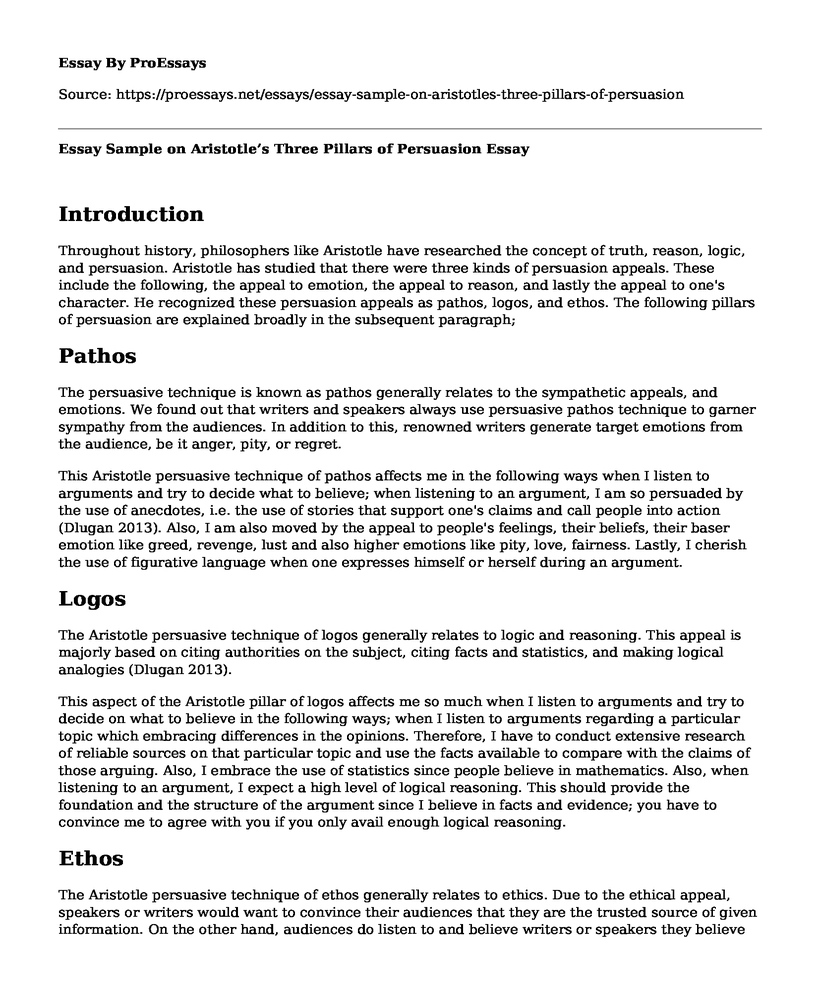Introduction
Throughout history, philosophers like Aristotle have researched the concept of truth, reason, logic, and persuasion. Aristotle has studied that there were three kinds of persuasion appeals. These include the following, the appeal to emotion, the appeal to reason, and lastly the appeal to one's character. He recognized these persuasion appeals as pathos, logos, and ethos. The following pillars of persuasion are explained broadly in the subsequent paragraph;
Pathos
The persuasive technique is known as pathos generally relates to the sympathetic appeals, and emotions. We found out that writers and speakers always use persuasive pathos technique to garner sympathy from the audiences. In addition to this, renowned writers generate target emotions from the audience, be it anger, pity, or regret.
This Aristotle persuasive technique of pathos affects me in the following ways when I listen to arguments and try to decide what to believe; when listening to an argument, I am so persuaded by the use of anecdotes, i.e. the use of stories that support one's claims and call people into action (Dlugan 2013). Also, I am also moved by the appeal to people's feelings, their beliefs, their baser emotion like greed, revenge, lust and also higher emotions like pity, love, fairness. Lastly, I cherish the use of figurative language when one expresses himself or herself during an argument.
Logos
The Aristotle persuasive technique of logos generally relates to logic and reasoning. This appeal is majorly based on citing authorities on the subject, citing facts and statistics, and making logical analogies (Dlugan 2013).
This aspect of the Aristotle pillar of logos affects me so much when I listen to arguments and try to decide on what to believe in the following ways; when I listen to arguments regarding a particular topic which embracing differences in the opinions. Therefore, I have to conduct extensive research of reliable sources on that particular topic and use the facts available to compare with the claims of those arguing. Also, I embrace the use of statistics since people believe in mathematics. Also, when listening to an argument, I expect a high level of logical reasoning. This should provide the foundation and the structure of the argument since I believe in facts and evidence; you have to convince me to agree with you if you only avail enough logical reasoning.
Ethos
The Aristotle persuasive technique of ethos generally relates to ethics. Due to the ethical appeal, speakers or writers would want to convince their audiences that they are the trusted source of given information. On the other hand, audiences do listen to and believe writers or speakers they believe are ethical. Certain group of speakers is experts in their topics hence they have the credibility all ready. Hence, the rest of us we must use all means available to convince the audience. One can do this by simply proving his or her reliability or character.
The ethos pillar of persuasion affects me in the following ways when I listen to an argument and consequently decide on what to believe; firstly, ethos encourages the feeling that I am fair which is ethical (Dlugan 2013). Also, through acknowledging the counter-argument which is the best way to build this aspect of ethos. Also, ethical appeals work since I believe that the speaker intends no harm, and then I will be willing to listen to the argument on what he or she has to say.
Conclusion
In summary, being aware of these three elements of persuasion namely, logos, ethos, and pathos are very important if you want to be an informed citizen in a functioning democracy in the following ways; logos are essential to every citizen because it appeals to the readers intellect, it also makes the readers feel smart. Also, the persuasive technique of ethos provides the citizen with an understanding for the benefit that a writer or speakers credibility has in establishing persuasions. Lastly, pathos is concerned with the ability of the writer or speaker to emotionally link to the audience she or he is speaking to.
Reference
Dlugan, A. (2013). Ethos, pathos, logos: 3 pillars of public speaking. Six Minutes, 2.
Cite this page
Essay Sample on Aristotle's Three Pillars of Persuasion. (2022, Nov 14). Retrieved from https://proessays.net/essays/essay-sample-on-aristotles-three-pillars-of-persuasion
If you are the original author of this essay and no longer wish to have it published on the ProEssays website, please click below to request its removal:
- Using Leadership to Improve Ethical Performance
- Socrates vs. Plato's Philosophy Essay
- Essay on Importance of Morality in Business
- Essay Sample on Aristotle's Theory of Causes: An Overview and Critique
- Plato's View on the Immortality of the Soul - Essay Sample
- Sally's Obligation: Re-Educate Patient on Alprazolam Prescription - Essay Sample
- Paper Sample on Socrates and Meno Debate Virtue: Is It Teachable?







